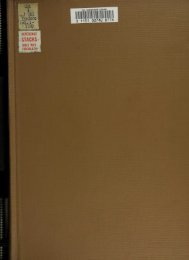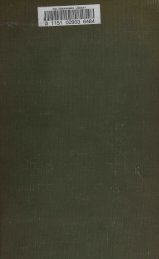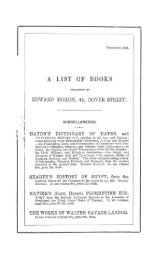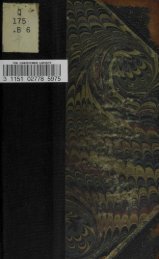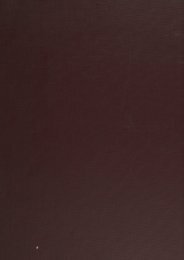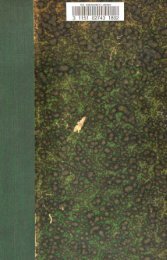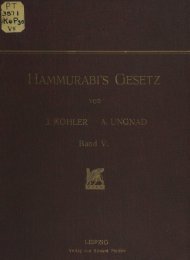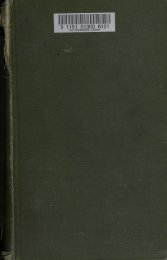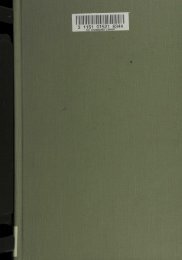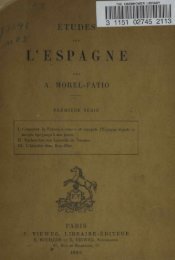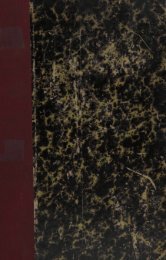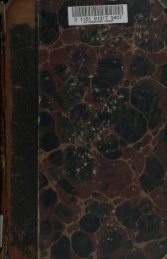- Page 1 and 2: ^ f. '.y 3 1151 UBBARV
- Page 5 and 6: G R E E K T H E O R I E S ELEMENTAR
- Page 7 and 8: ^ P R E F A C E N Most readers know
- Page 9 and 10: COMMENTARIES, MONOGRAPHS, &c. USED
- Page 11: COMMENTARIES, MONOGRAPHS, &c. vii S
- Page 14 and 15: a INTRODUCTION connexion we have he
- Page 16 and 17: 4 INTRODUCTION (however difficult t
- Page 18 and 19: 6 INTRODUCTION and of mind so far a
- Page 20 and 21: 8 INTRODUCTION once take us beyond
- Page 22 and 23: 10 THE FIVE SEN.SES psychology H. A
- Page 24 and 25: la THE FIVE SENSES discoverles resp
- Page 26 and 27: Empedocles. 14 THE FIVE SENSES Empe
- Page 28 and 29: i6 THE FIVE SENSES one who purposes
- Page 30 and 31: i8 THE FIVE SENSES and agency of th
- Page 32 and 33: 20 THE FIVE SENSES Colours are carr
- Page 34 and 35: Theophrastus criticizes Empedocles'
- Page 36 and 37: 24 THE FIVE SENSES the nature 'like
- Page 38 and 39: 26 THE FIVE SENSES the whole it wou
- Page 42 and 43: 30 THE FIVE SENSES image): ' They a
- Page 44 and 45: 32 THE FIVE SENSES and dissimilar;
- Page 46 and 47: colour and its varieties, 34 THE FI
- Page 48 and 49: ^6 THE FIVE SENSES the entrance of
- Page 50 and 51: 38 THE FIVE SENSES Vision due 'Seei
- Page 52 and 53: 4° THE FIVE SENSES express Empedoc
- Page 54 and 55: 42 THE FIVE SENSES and see bright b
- Page 56 and 57: 44 THE FIVE SENSES also is set fort
- Page 58 and 59: 46 THE FIVE SENSES commonly that we
- Page 60 and 61: 48 THE FIVE SENSES senses. The orga
- Page 62 and 63: 50 THE FIVE SENSES Genesis of § 30
- Page 64 and 65: 52, THE FIVE SENSES A kind of fire,
- Page 66 and 67: 54 THE FIVE SENSES as it has a brig
- Page 68 and 69: 55 THE FIVE SENSES and the object w
- Page 70 and 71: 58 THE FIVE SENSES Empe- parent, no
- Page 72 and 73: 6o THE FIVE SENSES of the diaphanou
- Page 74 and 75: 6a THE FIVE SENSES to get an infini
- Page 76 and 77: 64 THE FIVE SENSES to actuality (bo
- Page 78 and 79: 66 THE FIVE SENSES other rays from
- Page 80 and 81: 68 THE FIVE SENSES of plants and an
- Page 82 and 83: 70 THE FIVE SENSES a contrary to ei
- Page 84 and 85: 7a THE FIVE SENSES (b) Super- (b) W
- Page 86 and 87: 74 THE FIVE SENSES we ought not to
- Page 88 and 89: 76 THE FIVE SENSES from US from pur
- Page 90 and 91:
78 THE FIVE SENSES Necessity § 46,
- Page 92 and 93:
8o THE FIVE SENSES objectively or e
- Page 94 and 95:
organ proper. Democritus' attitude.
- Page 96 and 97:
84 THE FIVE SENSES due to a are ext
- Page 98 and 99:
86 THE FIVE SENSES should be convey
- Page 100 and 101:
88 THE FIVE SENSES power and percep
- Page 102 and 103:
90 THE FIVE SENSES sight, not prima
- Page 104 and 105:
92 THE FIVE SENSES them at a distan
- Page 106 and 107:
94 THE FIVE SENSES which gives KotX
- Page 108 and 109:
96 THE FIVE SENSES that the gloss K
- Page 110 and 111:
98 THE FIVE SENSES to the outer sou
- Page 112 and 113:
100 THE FIVE SENSES Conditions One
- Page 114 and 115:
102 THE FIVE SENSES broken up from
- Page 116 and 117:
I04 THE FIVE SENSES proportion sens
- Page 118 and 119:
lo6 THE FIVE SENSES by the same thi
- Page 120 and 121:
Theophrastus' Version of Plato's de
- Page 122 and 123:
110 THE FIVE SENSES What is not so
- Page 124 and 125:
112 THE FIVE SENSES shock com- even
- Page 126 and 127:
proper is formed of an airchamber b
- Page 128 and 129:
ii6 THE FIVE SENSES tion of the mov
- Page 130 and 131:
ii8 THE FIVE SENSES from ifiöipos.
- Page 132 and 133:
I20 THE FIVE SENSES learning cernin
- Page 134 and 135:
122 THE FIVE SENSES Confusing § 27
- Page 136 and 137:
124 THE FIVE SENSES the auditory se
- Page 138 and 139:
126 THE FIVE SENSES for musical acq
- Page 140 and 141:
128 THE FIVE SENSES Actual proporti
- Page 142 and 143:
130 THE FIVE SENSES In the de Sensu
- Page 144 and 145:
132 THE FIVE SENSES tion of the bra
- Page 146 and 147:
134 THE FIVE SENSES Theophras- § 4
- Page 148 and 149:
136 THE FIVE SENSES as the most gen
- Page 150 and 151:
138 THE FIVE SENSES Large when thin
- Page 152 and 153:
I40 THE FIVE SENSES for he represen
- Page 154 and 155:
144 THE FIVE SENSES into genera of
- Page 156 and 157:
nor followed by pain. Not so valu
- Page 158 and 159:
146 THE FIVE SENSES Organ of betwee
- Page 160 and 161:
14» THE FIVE SENSES air or air or
- Page 162 and 163:
I50 THE FIVE SENSES Inhalation §17
- Page 164 and 165:
15« THE FIVE SENSES the ' scent,'
- Page 166 and 167:
154 THE FIVE SENSES medium one shou
- Page 168 and 169:
156 THE FIVE SENSES fied in divisib
- Page 170 and 171:
158 THE FIVE SENSES smells general,
- Page 172 and 173:
THE ANCIENT GREEK PSYCHOLOGY OF TAS
- Page 174 and 175:
i6a THE FIVE SENSES severally. pred
- Page 176 and 177:
i64 THE FIVE SENSES the effect upon
- Page 178 and 179:
i66 THE FIVE SENSES tion), e.g. tho
- Page 180 and 181:
.168 THE FIVE SENSES perceive prepo
- Page 182 and 183:
170 THE FIVE SENSES fj^ovfj in rest
- Page 184 and 185:
172 THE FIVE SENSES tongue, if they
- Page 186 and 187:
174 THE FIVE SENSES upon the of the
- Page 188 and 189:
i^e THE FIVE SENSES latter is in it
- Page 190 and 191:
178 THE FIVE SENSES food; for touch
- Page 192 and 193:
A Icmaeon—Empedocles. THE ANCIENT
- Page 194 and 195:
i8a THE FIVE SENSES ofthis. a kind
- Page 196 and 197:
i84 THE FIVE SENSES This question w
- Page 198 and 199:
i86 THE FIVE SENSES base of support
- Page 200 and 201:
i88 THE FIVE SENSES and the of body
- Page 202 and 203:
I90 THE FIVE SENSES trarieties whit
- Page 204 and 205:
jgz THE FIVE SENSES uncertain^.' He
- Page 206 and 207:
194 THE FIVE SENSES to water and ai
- Page 208 and 209:
196 THE FIVE SENSES in which why, w
- Page 210 and 211:
198 THE FIVE SENSES ofall and defin
- Page 212 and 213:
aoo THE FIVE SENSES fineness of of
- Page 214 and 215:
PART II. SENSATION IN GENERAL ITS C
- Page 216 and 217:
ao4 SENSATION IN GENERAL Sensation
- Page 218 and 219:
2o6 SENSATION IN GENERAL whatever,
- Page 220 and 221:
2o8 SENSATION IN GENERAL the above
- Page 222 and 223:
3IO SENSATION IN GENERAL distinguis
- Page 224 and 225:
212 SENSATION IN GENERAL and hearin
- Page 226 and 227:
314 SENSATION IN GENERAL reach far;
- Page 228 and 229:
2l6 SENSATION IN GENERAL in bodily
- Page 230 and 231:
218 SENSATION IN GENERAL that, as i
- Page 232 and 233:
220 SENSATION IN GENERAL Affinity b
- Page 234 and 235:
222 SENSATION IN GENERAL as the res
- Page 236 and 237:
224 SENSATION IN GENERAL through is
- Page 238 and 239:
226' SENSATION IN GENERAL the quadr
- Page 240 and 241:
228 SENSATION IN GENERAL ception, t
- Page 242 and 243:
230 SENSATION IN GENERAL own power
- Page 244 and 245:
232 SENSATION IN GENERAL and there-
- Page 246 and 247:
234 SENSATION IN GENERAL on the oth
- Page 248 and 249:
236 SENSATION IN GENERAL Ta Kara av
- Page 250 and 251:
238 SENSATION IN GENERAL and the al
- Page 252 and 253:
240 SENSATION IN GENERAL four ele-
- Page 254 and 255:
242 SENSATION IN GENERAL to the aö
- Page 256 and 257:
244 SENSATION IN GENERAL Apparent
- Page 258 and 259:
246 SENSATION IN GENERAL taste must
- Page 260 and 261:
248 SENSATION IN GENERAL so perceiv
- Page 262 and 263:
PART III. SENSUS COMMUNIS The § I.
- Page 264 and 265:
252 SENSUS COMMUNIS (vvihai = disti
- Page 266 and 267:
354 SENSUS COMMUNIS in the of the s
- Page 268 and 269:
256 SENSUS COMMUNIS of central duct
- Page 270 and 271:
Diogenes discussed memory and remin
- Page 272 and 273:
25o SENSUS COMMUNIS statement has a
- Page 274 and 275:
202 SENSUS COMMUNIS we require two,
- Page 276 and 277:
264 SENSUS COMMUNIS them are opinio
- Page 278 and 279:
Reminiscence illustrated. The dovec
- Page 280 and 281:
268 SENSUS COMMUNIS is reminiscence
- Page 282 and 283:
270 SENSUS COMMUNIS of plants. to c
- Page 284 and 285:
272 SENSUS COMMUNIS continuance of
- Page 286 and 287:
274 SENSUS COMMUNIS is forgotten In
- Page 288 and 289:
276 SENSUS COMMUNIS cannot extract
- Page 290 and 291:
278 SENSUS COMMUNIS faculty compreh
- Page 292 and 293:
28o SENSUS COMMUNIS satisfectory in
- Page 294 and 295:
28a SENSUS COMMUNIS In the concludi
- Page 296 and 297:
284 SENSUS COMMUNIS gulf would be c
- Page 298 and 299:
286 SENSUS COMMUNIS They are called
- Page 300 and 301:
288 SENSUS COMMUNIS C. Sensus § 29
- Page 302 and 303:
290 SENSUS COMMUNIS dvTaapa ing as
- Page 304 and 305:
29^ SENSUS COMMUNIS not, like and a
- Page 306 and 307:
294 SENSUS COMMUNIS ep.ireipia. As
- Page 309 and 310:
SENSUS COMMUNIS 297 aladrjais^- The
- Page 311 and 312:
SENSUS COMMUNIS 299 be regarded as
- Page 313 and 314:
SENSUS COMMUNIS 30X and motion. Hen
- Page 315 and 316:
SENSUS COMMUNIS 303 were, straight
- Page 317 and 318:
SENSUS COMMUNIS 305 times quiet pre
- Page 319 and 320:
SENSUS COMMUNIS 307 to correct it.
- Page 321 and 322:
SENSUS COMMUNIS 309 but in the rela
- Page 323 and 324:
SENSUS COMMUNIS 311 a piece of wax
- Page 325 and 326:
SENSUS COMMUNIS 313 tion), as a lik
- Page 327 and 328:
SENSUS COMMUNIS 315 lesson indeed ;
- Page 329 and 330:
SENSUS COMMUNIS 317 that which we s
- Page 331 and 332:
SENSUS COMMUNIS 319 one and the sam
- Page 333 and 334:
SENSUS COMMUNIS 321 for reviving th
- Page 335 and 336:
SENSUS COMMUNIS 323 to the (pdvraaj
- Page 337 and 338:
SENSUS COMMUNIS 325 it set up still
- Page 339 and 340:
SENSUS COMMUNIS 327 'each aladrjais
- Page 341 and 342:
SENSUS COMMUNIS 329 extent. For eve
- Page 343 and 344:
SENSUS COMMUNIS 331 (b) The heart i
- Page 345 and 346:
SENSUS COMMUNIS 333 of Sensation ar
- Page 347 and 348:
SENSUS COMMUNIS 335 the TTvevjxa. A
- Page 349 and 350:
I N D I C E S I. ENGLISH Absent, th
- Page 351 and 352:
primary, 53 ; of rainbow, 53, 66 ;
- Page 353 and 354:
L ENGLISH 341 line lens, 10 ; like
- Page 355 and 356:
Inconsistency, Aristotle's (real or
- Page 357 and 358:
23g, 24S ; of sense, general defini
- Page 359 and 360:
I. ENGLISH 347 by persons of low ty
- Page 361 and 362:
Stimulus of perception, 8. Stobaeus
- Page 363 and 364:
II. GREEK ayyeiov, 95. äypdpparos:
- Page 365 and 366:
peaönjs and Ai57or, of sense, 117,
- Page 368:
'OES 'ilE fiOf



